Different Types of Welding Rods & Their Uses
In this article, you will learn what are different types of welding rods in welding? How and When to use them? Explained with pictures.
If you need this article in PDF form, you can download it at the end.
What is Welding Rod?
If you are a DIY enthusiast who welds just a couple of times or a professional fabricator who welds daily, performing the welding process requires a lot of skill. Many important tools are used in weldings, such as hammers, welding machines, gloves, goggles, and welding rods.
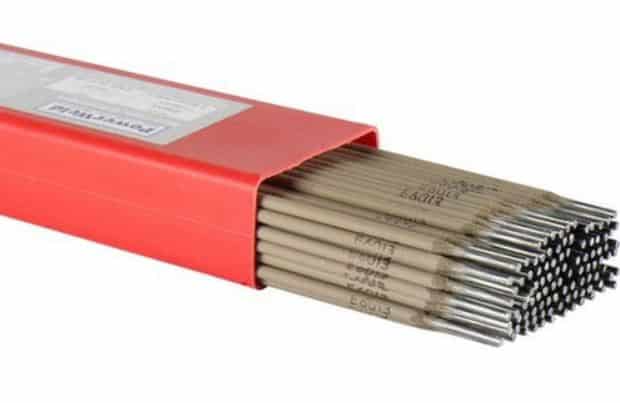
Before we explore the different types of welding rods, let’s understand what they are. A welding rod consists of 2 different metals, wires, or fillers that, when you connect them to a base metal, the electric heat will bond between the two parts of the metal together with a smooth finish.
Welding rods are commonly used in shielded metal arc welding (SMAW). It can also be called a welding electrode. It mainly provides filler metal to the workpiece and conducts electric current to the arc.
Choosing the right welding rod is challenging; using the wrong electrode can lead to a bad weld. To take your flawless welding craft to the next level, you must be well-versed in welding rods. Therefore, we will discuss and guide you on the most common welding rods and their uses. Let’s get started.
Checkout: What are the common types of Welding Defects? [Causes, Remedies]
Types of Welding Electrodes
 Unless you primarily do TIG welding, you will utilize consumable electrodes using an arc welder with carbon electrodes. Carbon electrodes are typically made of carbon graphite and are non-consumable.
Unless you primarily do TIG welding, you will utilize consumable electrodes using an arc welder with carbon electrodes. Carbon electrodes are typically made of carbon graphite and are non-consumable.
#1 Non-consumable Electrodes
A non-consumable electrode remains intact, does not change its properties, and melts. However, non-consumable sticks can wear out over time due to oxidation or evaporation. The sole purpose of using such electrodes is to set and maintain an electric arc.
The only problem is that you manually need to feed fillers when working with non-consumable electrodes. These electrodes are used in tungsten inert gas welding (TIG), carbon arc welding (CAW), and atomic hydrogen welding (AHW). Non-consumable electrodes mainly contain carbon and tungsten electrodes.
#1 Carbon Electrodes
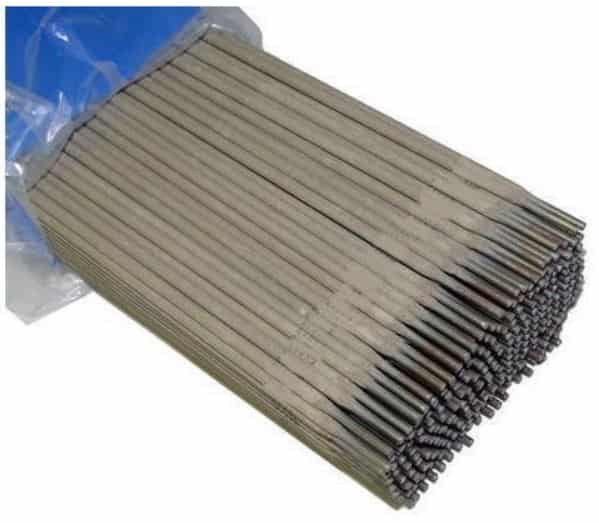
The carbon electrode generates an electric arc between the electrode and the bonded material. This arc produces temperatures above 3,000 °C. These welding electrodes are older and less common in welding, although it is still in use.
Since it generates a high arc, it is challenging to control compared to the arc of other processes. It is suitable for heating metals and cutting holes in metals but is not used to weld thin metals.
#2 Tungsten Electrode
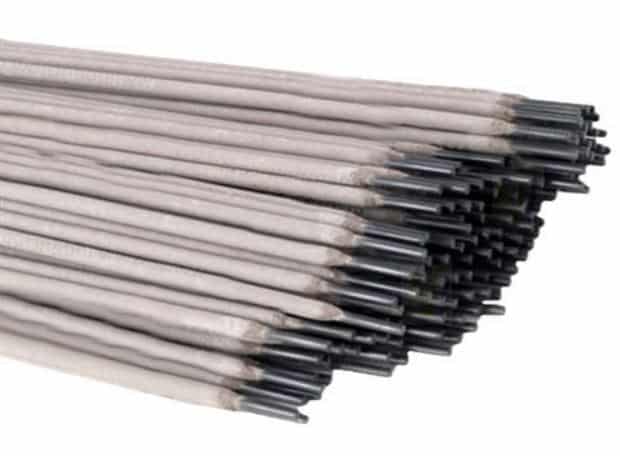
Tungsten electrodes are suitable for arc welding with an tungsten inert gas (TIG) process or when performing plasma welding. These are the most popular types of non-consumable electrodes.
Tungsten electrodes are made from pure tungsten or a combination of tungsten and thorium or tungsten and zirconium. Pure tungsten electrodes are suitable for small projects on thin metals because they do not require high amperage.
Tungsten zirconium electrode is used for heavy metals but is not as durable as tungsten thorium electrode. Tungsten Thorium electrodes are popular types that produce the strongest welds with high amperage.
#2 Consumable Electrodes
A consumable electrode works exactly as it sounds. When these filler electrodes are used, the rods are melted and consumed to bridge the gap between the parent metal and the other metal part. Consumable electrodes are used in both MIG welding and arc welding.
Consumable electrodes are melted during the welding process, unlike the non-consumable electrode. Standard welding consumable electrodes are stick, solid, and flux-cored wire. Consumable electrodes are further classified as the bare or coated types for the arc welding process.
Bare electrodes typically do not have a flux coating to shield the weld pool, and welding is mostly used for manganese steel. Coated electrodes are again classified into three types.
#1 Light Coated Electrodes
Light-coated electrodes have a thin layer of flux. However, flux does not produce a reliable shielding gas that protects the weld pool from contaminants such as phosphorus or sulfur. Lightly coated electrodes produce less slag than medium or heavy coated electrodes, with a coating factor of about 1.25.
#2 Medium Coated Electrodes
Medium coated electrode with a coating factor of 1.45. They offer many benefits, such as exceptional arc control, easily removable slag, and the ability to weld in any position. These are primarily used in offshore drilling applications, bridge construction, and pipeline welding.
#3 Heavy Coated Electrodes
Heavy-coated electrodes are used to obtain high-quality weld metal, comparable and even superior to the parent metal in terms of mechanical properties. It has a coating factor of 1.6 to 2.2, which helps form an effective shielding gas to protect the weld when the weld pool is ignited.
Read Also: Different Types of Metals and Their Properties [PDF]
Types of Welding Rods
Following are the common types of welding rods:
- Low hydrogen carbon steel electrode
- Mild steel electrodes
- Stainless steel electrodes
- Aluminum welding rods
- Bronze welding rods
#1 Low Hydrogen Carbon Steel Electrode
It is a primary coated low hydrogen iron powder electrode for low-temperature applications. It is an all-position electrode for welding medium tensile and fine-grained carbon steels. These welding rods offer good weld beads, perfect for welding and cutting thick materials.
In addition, it also offers impressive durability and provides easy generation and retention on the arc. These are also efficient in bonding carbon steels and low alloy steels. In addition, the electrode exhibits excellent mechanical properties after an extended post.
#2 Mild Steel Electrodes
Mild steel electrodes are made of high quality but with a low concentration of carbon steel deposits. This electrode operates at low OCV (50V) AC under all conditions. They have the considerable tensile strength to keep a long arc lasting.
These are widely used in shipbuilding, rail wagons, pipelines, and the automobile industry. In addition, it provides a smooth and stable welding arc with low spatter, excellent slag detachability, and a soft weld bead formation.
#3 Stainless Steel Electrode
It is a basic electrode that provides a weld metal in low carbon austenitic stainless steel. It is designed to provide and maintain a consistent weld quality irrespective of the effects of temperature and weather.
These rods offer excellent resistance to corrosion, smooth welding, and easy slag removal. Welding electrodes deliver stunning and durable project work that only screams quality and superior craftsmanship.
#4 Aluminum Welding Rods
These welding rods are multipurpose for welding aluminum, suitable for pure aluminum welds and welds of different aluminum alloys. It produces high-quality welds and allows strong, dense, porosity, and crack-free deposits.
Aluminum welding rods can work with almost any non-ferrous metal. These are easy to use, fast weld rate, less spatter, and smooth operation.
#5 Bronze Welding Rods
Bronze welding rods are used almost only to join copper to dissimilar metals or to repair bronze workpieces. These rods are also used in brazing, which is when a filler metal is used. In this case, it has a lower melting point than adjacent metals to close the gap between the workpieces.
Types of Welding Rods According To Their Numbers
#1 6010
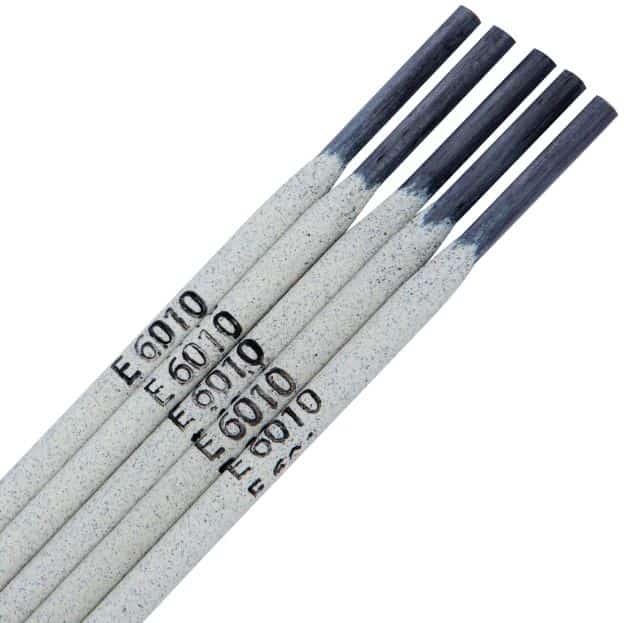
The 6010 electrode is a general-purpose electrode that performs welding efficiently in vertical-up and overhead positions. However, the electrode deposition rate is not high. These are popular types used for deep penetration. These electrodes are only suitable with DC power sources.
This electrode has a highly tight arc, which can be difficult for amateur welders. The 6010 electrode arc is easy to control and produces a flat weld bead with mild slag formation. These welding rods are specified for pipe welding and field construction, ships, water towers, pressure vessels, and steel storage tanks.
#2 6011
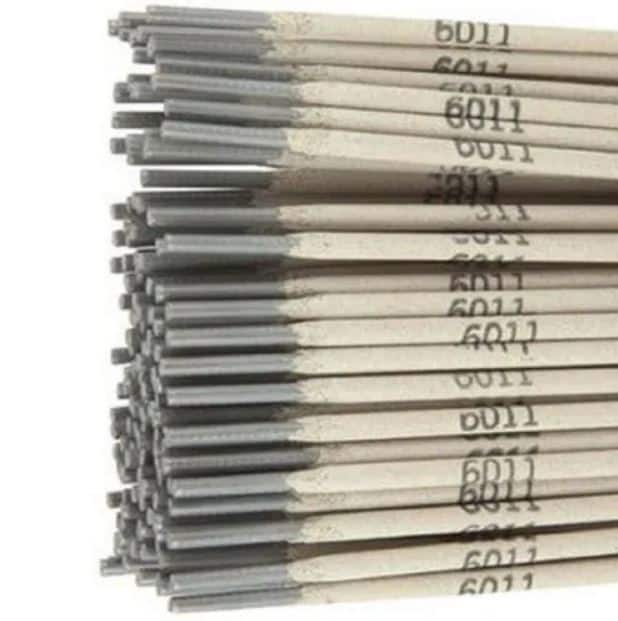
6011 welding rods can produce welds with a minimum tensile strength of 60,000 psi. It is an all-position electrode with a soft arc, minimal spatter, moderate penetration, and easily removable slag. This electrode can run on both AC and DC power sources.
This produces an easily controlled arc with deep penetration and high-quality weld metal. These electrodes are suitable for new and clean materials, thinner materials, and broader root openings. 6011 welding rods are famous for repairing cars, engines, agricultural equipment, and other greasy, rusty, and dirty items.
#3 6012
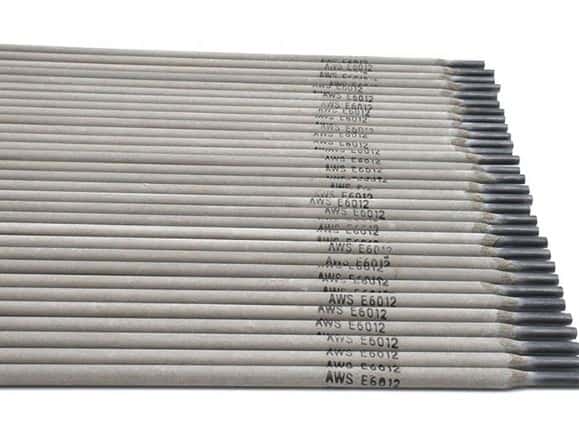
6012 welding rods are general-purpose electrodes that deliver excellent bridging characteristics, especially for applications with poor fit-up. These electrodes have a stable arc and operate at high currents with low spatter.
Extremely versatile, these electrodes can be compatible with AC and DC sources. For welding where you require a smooth and clean appearance, the 6012 electrode is a perfect choice. This electrode is used for welding sheet metal and other low-current applications.
#4 6013
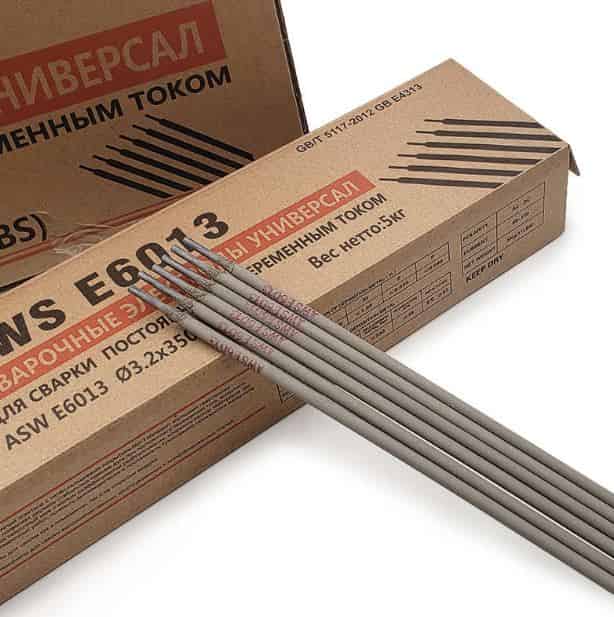
6013 welding rod is an all-purpose electrode that provides a soft, steady arc easily restored, easy slag control for vertical-down welding, low spatter, and a beautiful bead appearance. It is highly titanic coated and primarily used for thin sheet metal applications.
These electrodes can be used in any position with AC or DC (straight or reverse polarity). 6013 electrodes are comparable to 6011 electrodes in tensile strength, welding conditions, and current types. These types of welding rods are used in new construction and fabrication works.
#5 7018
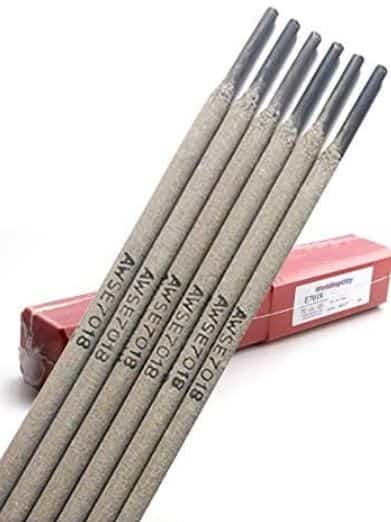
7018 welding rods are prepared for low, medium, high carbon steels, and high strength low alloy steels. It is an all-position electrode with a thick flux and high iron powder content, making it the easiest to use. These are suitable with AC and DC power sources.
These electrodes are known to produce a smooth, quiet arc with minimal spatter and moderate arc penetration. This rod will help to give you proper control over the arc and reduce post-weld disturbances. These welding rods create strong welds with a minimum tensile strength of 70,000 psi.
#6 7024
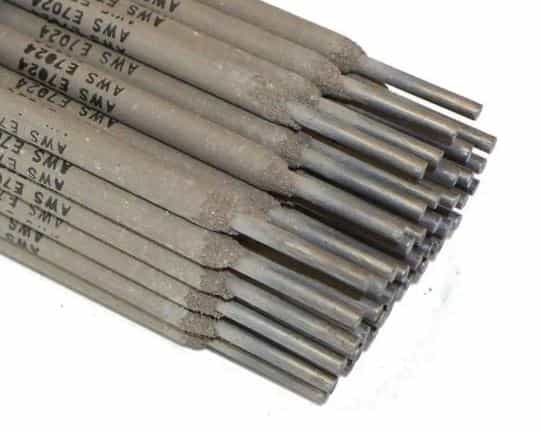
7024 is a high-speed, heavy-coated, iron powder electrode used for high deposition rates on horizontal and down hand welding. They provide excellent operator appeal, excellent bead appearance, and self-cleaning slag.
These electrodes can also be powered with an AC or DC power source. This electrode has high iron powder content, which helps in improving the deposition rate. It can perform well on a steel plate for at least ¼ inch. Thick and can be used on metals that measure more than ½ in.
Read Also: Types of Welding Joints (Explained in Detail)
What is Electrode Coating?
Electrode coatings are made of minerals, organic materials, Ferro-alloys, and iron powders bonded to sodium or potassium silicate. It provides gas shielding for the arc, easy striking arc stability, a protective slag, good weld shape, and protects the molten weld metal.
The coating is covered with a relatively high-quality coating applied in a layer 1 to 3 mm thick. The weight of such a coating ranges between 15 to 30% of the electrode weight. The primary purpose of the light coating is to increase arc stability. Since the electrode coating is brittle, only straight stick electrodes can be used.
Advantages of Coating
- It improves arc stability by providing certain chemicals that have this ability by ionizing the arc’s path.
- It supplies flux that helps remove oxides and other impurities from molten metals.
- This reduces the splatter of weld metal when the coating burns slower than the core.
- This slows down the cooling rate of the weld to prevent hardening.
Types of Coatings
Since there are many characteristics within each type of electrode coating, the unique chemical makeup of each coating will give different properties. There are many different types of coatings, and be sure to research the best applications of each coating to make sure you’ve chosen the right one for your project.
#1 Cellulose Coating
These coatings contain about 1/3 cellulose and 2/3 of other organic materials. When exposed to the welding arc, the material decomposes to form three different gases, hydrogen, carbon monoxide, and carbon dioxide, which strengthen the arc.
Due to this, it allows current to penetrate more deeply into the metal, resulting in stronger welds. In addition, it emits a layer of gas to protect the weld pool from impurities. Cellulose coatings are available in various chemical mixtures with unique properties and the best applications.
#2 Mineral Coating
Mineral coatings leave a layer of slag on top of the weld metal. While slag may seem an annoying side effect, it serves a beneficial purpose. The slag of a mineral-coated electrode cools much more slowly than a cellulose-coated electrode.
This gives the impurities time to filter onto the metal surface, preventing them from compromising the structure of the weld.
#3 Mixture
It combines cellulose and minerals and is a popular choice among fabricators as they offer the best of both chemicals. Since these coatings contain a few components and more ingredients, the chemical diversity offers several significant advantages.
The shielding gas and slag protection on welds can be incredibly useful, especially when working with temperamental base metals.
Meaning of Number Printed on Welding Rods
The welding electrode numbering system may initially seem confusing, but once you understand the number, it will be easy to choose an electrode for your job. This system is developed by AWS, which tells how much pressure the rod can withstand, the proper weld position, flux composition, and the right current to choose.
How To Identify?
The most widely used welding rods are 7018, 7014, 6013, 6011, and 6010. For example, using a 6010 welding rod can determine the tensile strength by the first two numbers. This number is represented by the pound per square inch (psi).
Multiplying 60 by 1000, you will get 60,000 (psi), which means this is the pressure that the weld can withstand. The third number of the welding rod defines the optimum position for welding. The only welding positions used are 1, 2, and 4.
1 means the welding rod can be used in all positions, 2 denotes a flat or horizontal position, and 4 represents an overhead or vertical position. In the case of the 6010 welding rod, this means that it can be used in all conditions. The last number describes the flux material and the suitable current to use.
The number 0 explains that the rod is made of high cellulose sodium, and the suitable current of the welding electrode is DC+. The rod coating is made of different metals, which are listed below.
| Number | Material | Current |
|---|---|---|
| 0 | High cellulose sodium | DC+ |
| 1 | High cellulose potassium | AC, DC+, DC- |
| 2 | High Titania sodium | AC, DC- |
| 3 | High Titania potassium | AC, DC+ |
| 4 | Iron powder, Titania | AC, DC+, DC- |
| 5 | Low hydrogen sodium | DC+ |
| 6 | Low hydrogen potassium | AC, DC+ |
| 7 | High iron oxide, potassium powder | AC, DC+, DC- |
| 8 | Low hydrogen potassium, iron powder | AC, DC+, DC- |
Read Also: What is Resistance Welding? Its Types, Working, & Applications
How To Choose Welding Rods?
Now you may think you are familiar with the different welding rods, but choosing one for a particular application is still difficult. The following are some important factors that every welder should consider when selecting electrodes.
#1 Base Metal
Before welding, one thing you should remember is the base metal’s composition. First, you must find a welding rod that matches the base metal closely. Doing this will increase your chances of making a strong and stable weld.
If you are not sure about the composition of the base metal, consider the following factors:
#1 Appearance of Metal
If you are working with a broken piece of metal, check its texture before welding. A rough or grainy surface means you are working with cast iron metal.
#2 Magnetic or Non-magnetic
Another way to determine a base metal is to distinguish whether the metal is magnetic or non-magnetic. If it is magnetic, there is a high probability of alloy steel or carbon steel. If it is non-magnetic, the base metal may be stainless steel, manganese steel, or a non-ferrous alloy such as brass, aluminum, copper, or titanium.
#3 Spark Type
In addition to the above, the welder should also check what kind of spark the base metal produces once against the grinder. The critical role here is that the more its spark flares up, the higher the carbon content of the base metal.
#2 Tensile Strength
It is necessary to match the tensile strength of the welding electrode to the base metal. If you fail to do so, it may result in cracking, among other blockages. To identify the tensile strength of a welding rod, you just need to check the first two numbers. I have already told you about the process of checking tensile strength.
#3 Welding Current
Most welding rods are compatible with AC and DC sources, while some support common power sources. To determine the type of current to be used with a welding rod, you need to check the fourth number of the rod.
#4 Welding Positions
To determine what position a particular electrode is eligible for, refer to the third digit in the AWS system. 1 is used for flat, horizontal, vertical, and overhead positions, while 2 is for flat and horizontal only. For example, a 6010 electrode can be used in flat, horizontal, vertical, and overhead positions.
#5 Specifications and Service
Be sure to assess the conditions the welded part will face during its service. If it is used in high heat or low-temperature environments subject to repetitive shock loading, a low hydrogen electrode with high ductility will reduce the chance of weld cracking.
Likewise, check welding specifications when working on critical applications such as pressure vessel or boiler construction. Most of the time, these welding specifications require you to use a specific electrode type.
Wrapping It Up
As I already said, these, also known as electrodes, are welding materials that are melted and infused in processes such as stick welding. A welding rod attaches to the welding machine, creating an electric arc between the base metal.



